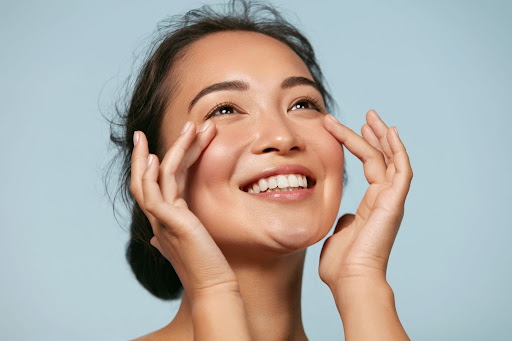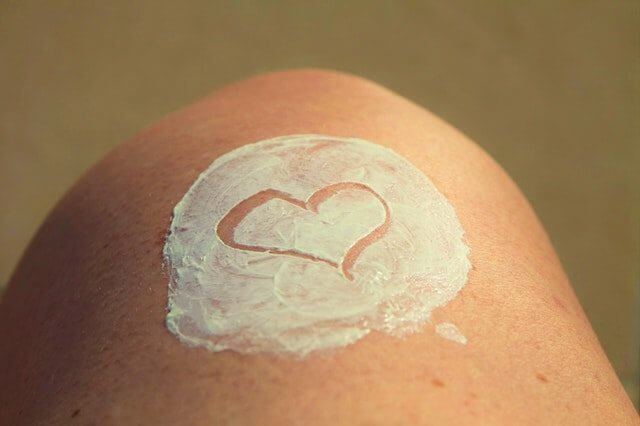
Your skin needs extra TLC in winter. However, keeping it hydrated during the summer is also essential. The additional sun, humidity, and sweating can make you susceptible to issues like clogged pores, blackheads, heat rashes, and longer-term effects from sun damage, such as skin pigmentation, wrinkles, and dark spots.
For ultimate summer skin hydration, we need to give our skin some extra love and attention — but the good news is that there’s plenty you can do to care for your skin. We’ve compiled 18 summer skincare tips on how to improve skin moisture and keep skin hydrated to help you maintain that healthy glow all summer.
Hydrated skin is exactly what it sounds like — skin that has absorbed enough water. It can function at its best and appears smooth and plump. It is radiant and evenly toned, giving you a glowing complexion rather than dry, dull and flaky skin.
A common misconception is that hydrated and moisturised skin is the same, but there’s a difference between the two. While dehydrated skin needs water, dry skin lacks oil or key nutrients.
A hydrating skin routine will add moisture back into the skin, whereas moisturising products will help maintain a protective barrier to help prevent moisture from evaporating. To keep skin healthy and radiant, you need to give your skin both.
The skin has three layers: the epidermis, the dermis and the hypodermis. The outermost layer of the epidermis is called the stratum corneum, which protects the skin against exterior elements such as the weather or your surrounding environment. Keeping this outermost layer of skin hydrated improves elasticity, makes it more resilient and helps it do this vital job.
Skin hydration can help you achieve glowing skin, but it also plays a vital role in the skin’s primary function, protecting against microbes and the elements. If your skin becomes dehydrated, it can, in turn, become weak and prone to splitting, cracking or inflammation, which increases the risk of infection.
According to Healthline, the following are all common symptoms of dehydrated skin:
These indications of dehydration are all easily reversible with the proper hydrating skincare routine.

These tips will help you improve skin hydration from the inside out. They include tips for the best summer moisturisers, what to eat and drink, and how to retain hydration once you’ve achieved it.
This is an obvious one, but it’s always worth a reminder — the best way to hydrate skin is to drink a good amount of water. Keeping yourself hydrated is even more important during summer, as the scorching heat will leave your body feeling more dehydrated and you’ll naturally lose more moisture as a result. Not only will water be refreshing and thirst-quenching in the sun, but it’ll also keep your skin moisturised.
A 2015 study showed that drinking enough water may be as effective as applying a topical moisturiser to the skin, so if you know you could improve your daily water intake, it’d be a sensible place to start.
Drinking plenty of fluids is also highly effective at flushing out toxins. In addition to water, we recommend drinking coconut water and green tea to keep those electrolytes topped up and detoxify the skin.
Harsh cleansers can strip the skin of natural oils and moisturising factors, leading to drying, cracking or redness. If your skin is dehydrated, try switching your cleanser to something gentler that doesn’t contain chemical exfoliants. Foam cleansers are often harsher than other cleansers, so you may want to switch out foam products for something gentler.
If your skin feels dehydrated despite regular moisturising, you may be using the wrong products. Water-boosting skincare products like lightweight gel creams can add moisture and keep it locked in, so they may be a better fit for your skin than a thick cream moisturiser. Products containing hyaluronic acid are great for skin hydration, so consider incorporating products with HA as a listed ingredient for a more hydrating skincare routine.
Another easy way to hydrate from the inside out is to eat lots of water-dense fruit and vegetables such as peaches, watermelon, beetroot, celery and spinach. Filling your diet with foods rich in water and antioxidants, like cucumber, berries, broccoli, and watermelon, can help make your skin more supple and healthy. For an extra boost, you could add more foods containing hyaluronic acid to your diet and stay away from salty snacks and food that can dehydrate your body.
If you’re in desperate need of extra skin hydration, think beyond your usual moisturiser. A hydrating serum will take your skincare routine to the next level and can be used day and night between cleansing and moisturising for smoother, plumper and more hydrated skin. The best products for hydrated skin are those that are rich in active ingredients but don’t leave your skin feeling greasy.
Did you know that skipping the exfoliation step of your skincare routine can prevent your skin from absorbing the hydrating products you’re applying? By regularly removing dead skin cells from the top layer of skin, your favourite products will penetrate the skin’s surface more easily, making them better able to do their job. Exfoliate at least once a week and apply a water-attracting skin hydration product straight after.
If you are switching out your moisturiser for a gel cream, you don’t need to get rid of it, as it’s perfect for nighttime use. Using a heavier moisturiser is the best way to hydrate skin at night, as it can work uninterrupted without normal interference, such as face-touching or outdoor pollution that you deal with in the daytime. A thick moisturiser keeps moisture locked in so it won’t evaporate while you sleep.
Applying moisturiser to damp skin can actually be better for your face than moisturising dry. Hydration comes from the water, and your product locks it in. After cleansing, gently pat your skin and leave it damp rather than completely dry before applying your lotion.
Do you often forget to extend your hydrating skincare routine past your face? Here’s a reminder to moisturise your neck and chest, as these areas can also require extra skin hydration. The neck is one area most prone to signs of ageing, so to maintain the illusion of youth, don’t neglect the neck. Remember, skin is the body’s largest organ, so you should treat all of it with care.
Cleansing should be done once in the morning and once before bed. Any more than this, and you risk stripping your skin of its natural oils and moisturising barrier agents. If you must cleanse your skin more than twice, remember to apply a light moisturiser afterwards.
It sounds obvious, but it’s all too easy to forget to top up your sun cream or get caught off guard without it. We’ve all been there. Protecting your skin is vitally important and can prevent lots of long-term damaging effects, such as brown spots, wrinkles and coarse skin. Apply and keep reapplying. Today’s brilliant technology and enhanced products mean there’s a sunscreen for all skin types, so you won’t need to worry about greasy skin, sensitivity, or reactions.
Applying a daily sun protection factor (SPF) will protect the skin from sun damage due to UV rays and aid skin hydration by forming a physical barrier on top of the skin that locks in moisture.
The best way to hydrate skin during a pamper session is with a face mask or sheet mask. Face masks are packed with hydrating ingredients to keep your skin moist and plump, with sheet masks holding the product in place for a more concentrated treatment.
You’ve probably wondered how to get rid of under-eye bags, but did you know that dark circles aren’t the only potential issue with the under-eye area? The skin around your eyes is so thin and fragile that it requires extra care, which is where a good eye cream comes into your skincare routine. A soothing gel cream will provide an instant dose of moisture, preventing the skin around your eyes from drying out.
Regularly taking long, steamy showers can undo all the hard work you’ve put in to get hydrated skin. Once you’ve established how to keep skin hydrated make sure you’re not also stripping the moisture with your shower habits. Hot water can strip your skin of moisture, so consider turning the temperature down the next time you jump in the shower.
The best way to hydrate skin in winter may well be investing in a humidifier. During the colder months, the air in our homes becomes very dry from having the heating on full-blast, which negatively affects skin hydration levels. A humidifier increases the humidity in the air, saving you from a tight, itchy face, chapped lips and cracked hands.
Add instant moisture to your face with a hydrating facial mist, which is perfect for spraying on just before applying moisturiser. As well as being great for skin hydration, facial sprays provide a refreshing boost on a hot day!
Some makeup products can be tough on dehydrated skin, so you may want to make a few changes to your makeup bag. Try introducing water-boosting ingredients such as glycerin, squalane and hyaluronic acid for improved skin hydration.
If you’re struggling to get healthy, hydrated skin, no matter what products you try, you may consider skin hydration therapy. Juvederm Volite is a rejuvenating treatment that aims to increase hydration and elasticity, as well as improve the texture of the skin. The injectable treatment has long-lasting effects, offering deep hydration for up to nine months, so it’s perfect to take you from summer to winter.
Hydrated, flawless skin can do wonders for your appearance and, most importantly, make you feel confident. If your skin needs a little seasonal pick-me-up, take a look at our non-invasive face treatments. Hand Rejuvenation can also combat signs of ageing for glowing, youthful-looking skin. Let our skincare experts help you get the glowing, hydrated skin you’ve always wanted.







